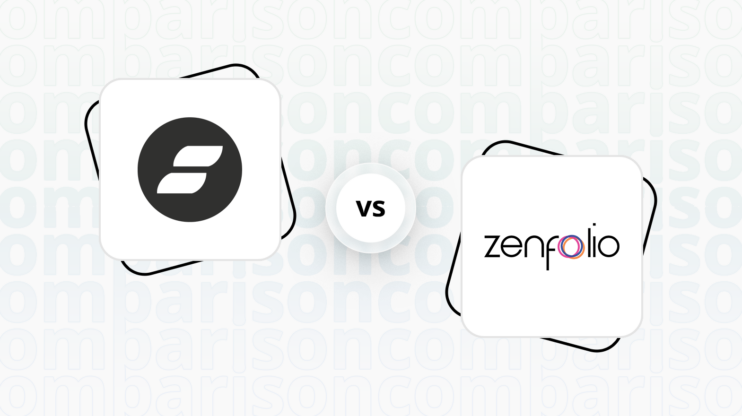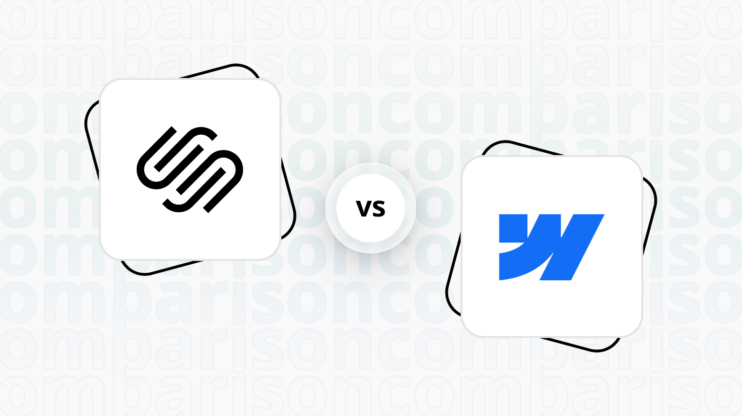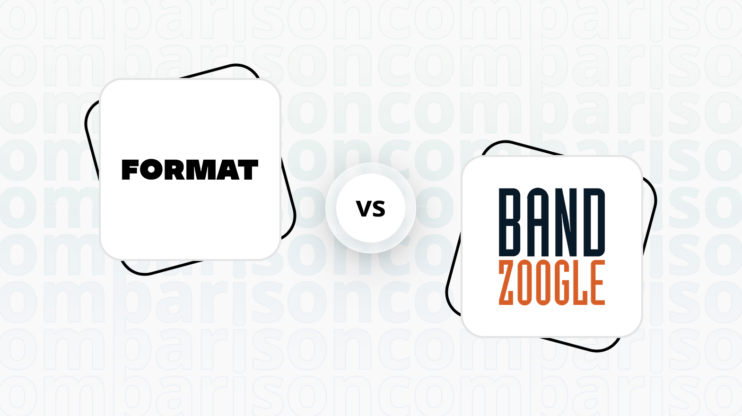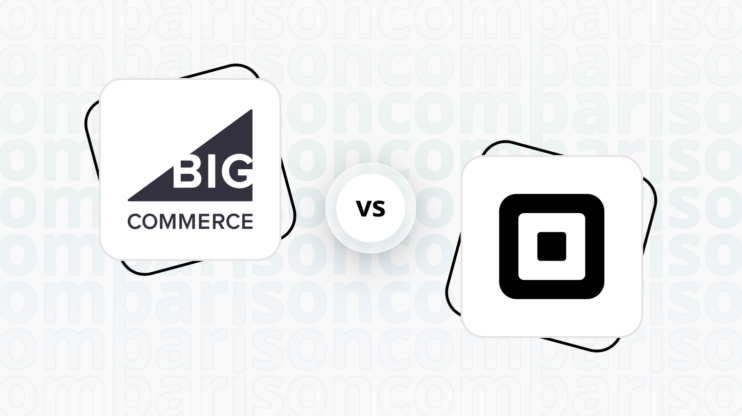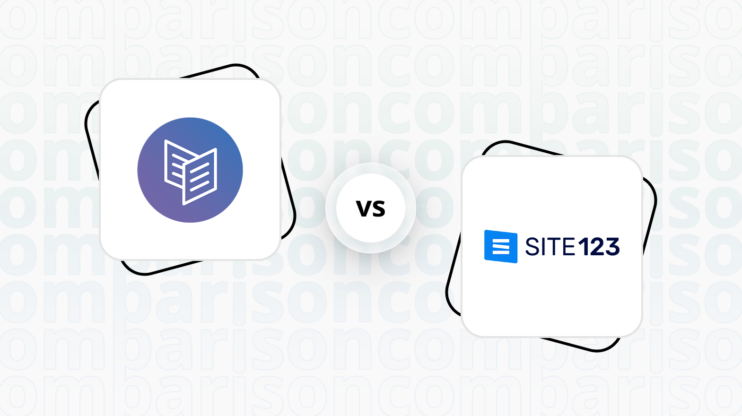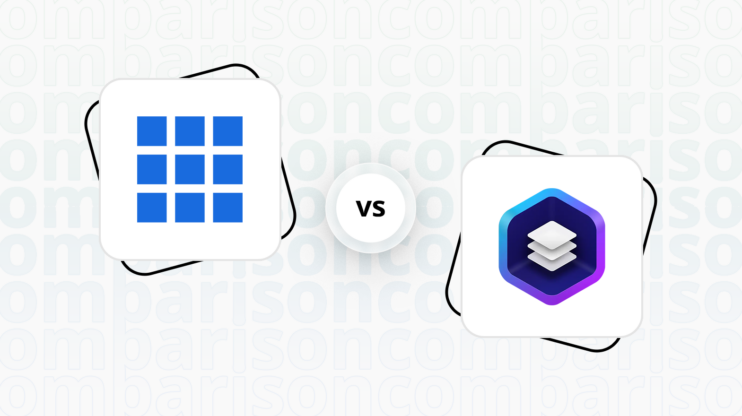Final verdict
Webflow vs HostGator: Both platforms offer unique strengths, but they cater to different user needs and expertise levels.
-
Webflow (Overall Grade: 7.9/10)
is a powerful tool for professional designers and developers, offering extensive design flexibility, robust ecommerce features, and top-tier hosting services. It excels in providing a comprehensive solution for creating custom, responsive websites without extensive coding knowledge. When comparing Webflow vs HostGator, Webflow stands out for its advanced design functionalities, superior website speed optimization, and strong security features, making it ideal for users seeking high customization and scalability. -
HostGator (Overall Grade: 6.2/10)
is a user-friendly platform designed for beginners and small businesses. It offers a simple drag-and-drop interface, a variety of customizable templates, and essential ecommerce features. In the Webflow vs HostGator comparison, HostGator is more accessible for users with no technical background, providing a straightforward website building experience and affordable pricing options. However, it falls short in advanced design capabilities and overall performance compared to Webflow.

|

|
|
|---|---|---|
|
Design functionalities & templates |
8.6 |
7.9 |
|
Ease of use |
7.5 |
8.0 |
|
Ecommerce |
8.5 |
6.3 |
|
Website editors |
9.0 |
7.3 |
|
Product testing options |
6.3 |
2.6 |
|
Price |
8.0 |
6.2 |
|
Hosting quality |
8.9 |
8.0 |
|
Website speed optimization |
8.1 |
6.2 |
|
Plugins and integrations |
5.5 |
7.3 |
|
Marketing features |
7.8 |
6.9 |
|
Customer support |
8.3 |
7.3 |
|
Security |
7.8 |
7.4 |
|
AI capabilities |
8.3 |
2.6 |
|
User Management |
8.3 |
3.2 |
Best for ecommerce
 8.5
8.5
 6.3
6.3
Verdict
: Webflow is a more robust and flexible ecommerce solution, while HostGator is suitable for budget-conscious users with simpler needs.
-
Webflow
: Webflow excels in ecommerce with its comprehensive features, including extensive customization options, integration with major payment gateways, and advanced marketing tools. It is ideal for users who need a powerful platform to create and manage a sophisticated online store. However, when comparing Webflow vs HostGator, Webflow might be more complex for beginners due to its advanced capabilities. -
HostGator
: HostGator offers a user-friendly website builder with essential ecommerce features, making it a good choice for those who need a straightforward and budget-friendly solution. It supports unlimited products on higher plans and integrates with PayPal for secure transactions. However, it lacks the depth and flexibility of Webflow’s ecommerce functionalities.
Best for informational & business websites
 8.6
8.6
 7.4
7.4
Verdict
: When it comes to creating informational and business websites, Webflow stands out as the superior choice due to its powerful design tools and flexible CMS. HostGator, while user-friendly and efficient, falls short in comparison to Webflow’s advanced capabilities.
-
Webflow
: Webflow is a robust platform designed for professional designers, offering a comprehensive solution for creating custom, responsive websites. Its powerful design tools, flexible CMS, and top-tier hosting services make it ideal for businesses looking to build a strong online presence. With a score of 8.6, Webflow excels in providing creative control and a wide array of design features, making it the preferred choice for informational and business websites. -
HostGator
: HostGator’s website builder is known for its simplicity and user-friendly interface, making it a great choice for beginners and small businesses. With a score of 7.4, it offers a variety of customizable templates and a drag-and-drop interface, allowing users to create professional-looking websites with ease. However, when comparing Webflow vs HostGator, HostGator lacks the advanced design capabilities and flexibility that Webflow provides, making it less suitable for more complex informational and business websites.
Detailed comparison
Design functionalities & templates
Design FunctionalitiesRepresents how well each platform allows for creative design and customization of websites.Score Components:
- Template Variety (30%): Range and quality of design templates.
- Customization (30%): Flexibility and options for design alterations.
- User Interface (20%): Ease and intuitiveness of the design process.
- Responsiveness (10%): Adaptability to different devices and screen sizes.
- Innovation (10%): Unique design features and tools.
 8.6
8.6
 7.9
7.9
🏆
Winner: Webflow.
If you’re looking for a platform that offers more creative control and a wide array of design features, Webflow is the preferred choice.
Webflow delivers a robust design experience with a diverse range of template and customization options. Boasting over 1000 pre-built templates covering various industries and website types, including free and premium options, Webflow ensures a constantly evolving library for users. Templates are categorized for easy browsing, considering industry, website type, style, and features. The design customization features include a visual drag-and-drop editor for real-time adjustments, fine-grained control over every aspect of the design, and the ability to inject custom code for advanced users seeking additional personalization and unique functionalities.
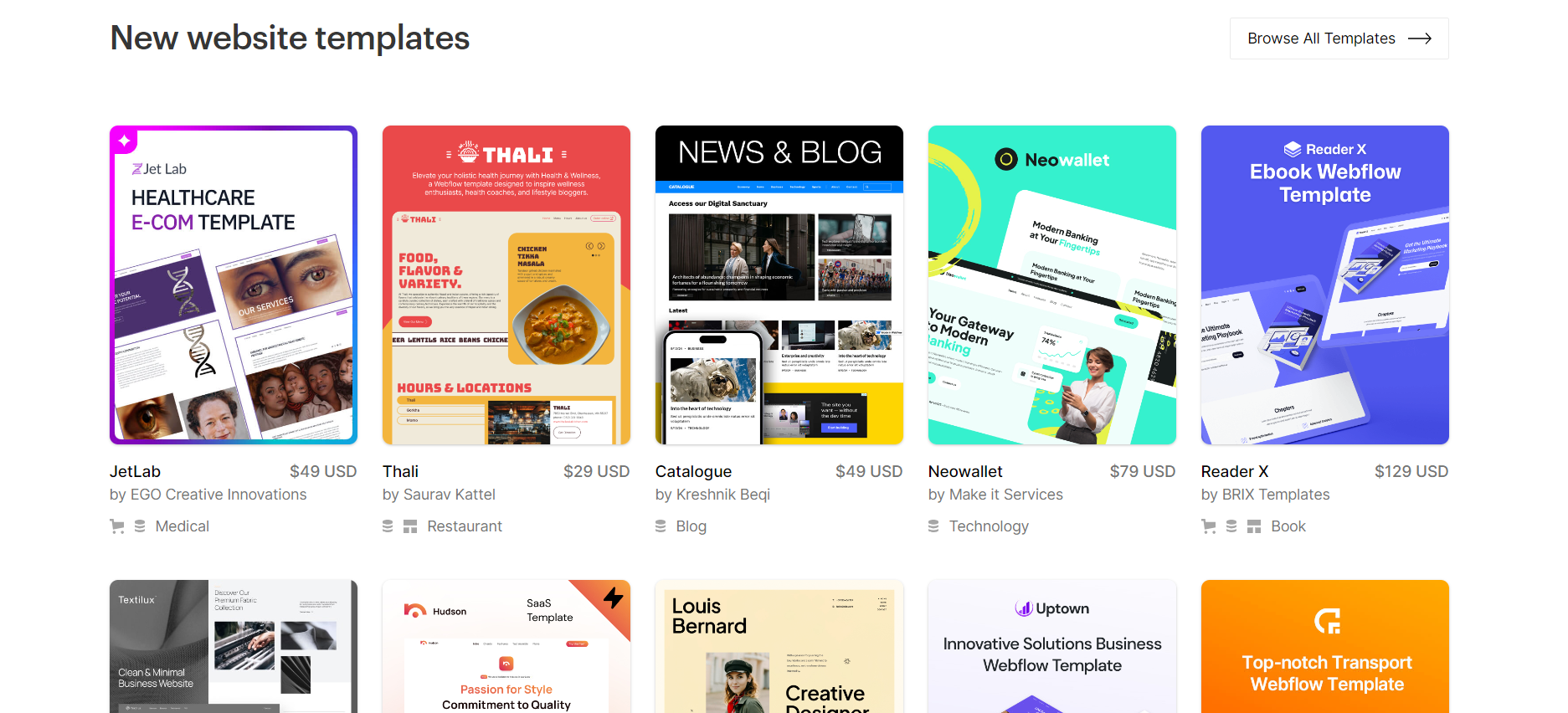
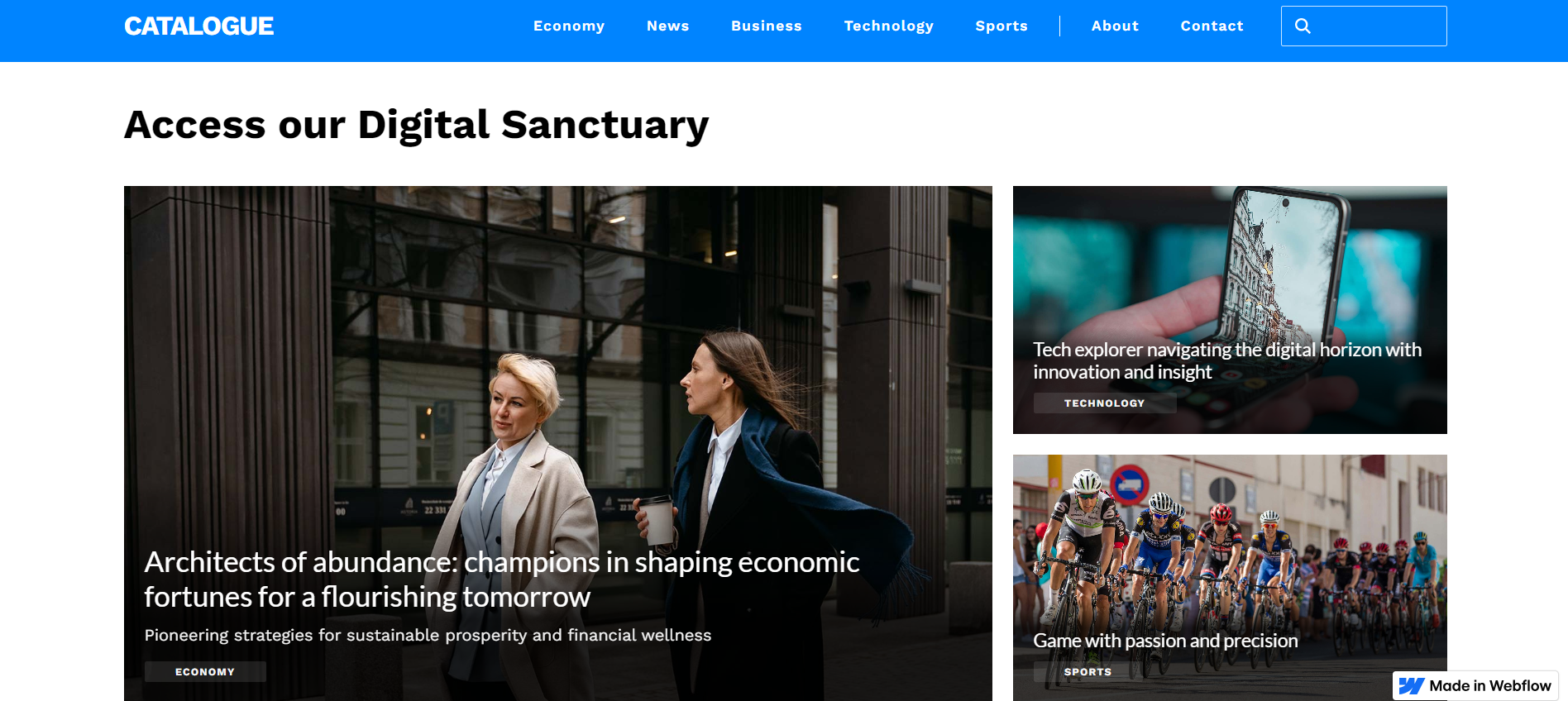
Compared to Webflow, HostGator website builder provides a substantial variety of design templates, catering to different user needs and preferences. It offers over 200 different mobile-friendly themes. Additionally, there’s a separate collection of 4,500 templates available for free download to users hosting their sites on HostGator servers, which are not interchangeable with the site builder’s own templates. This vast collection ensures that users have a wide range of design options to choose from, whether they seek simplicity for a professional presence or more intricate designs for complex websites.
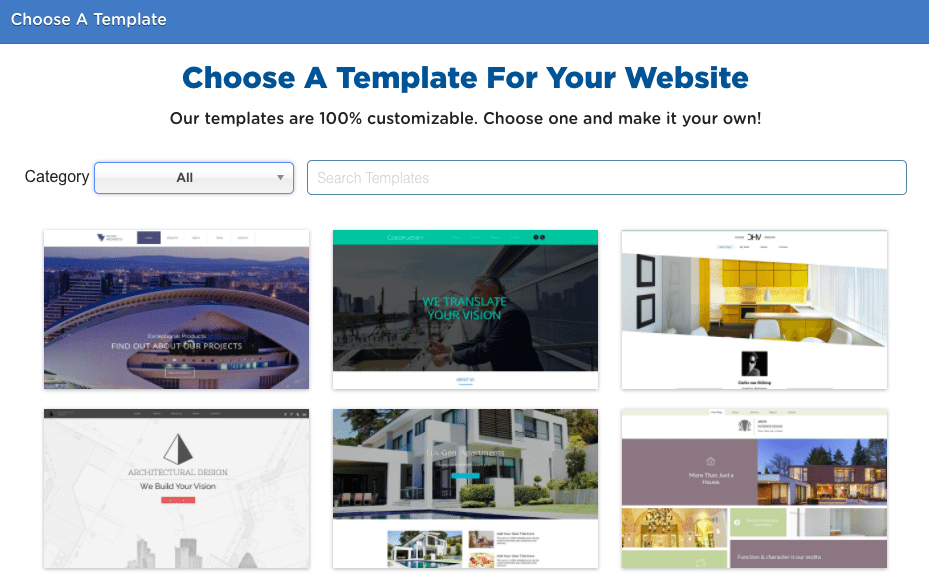
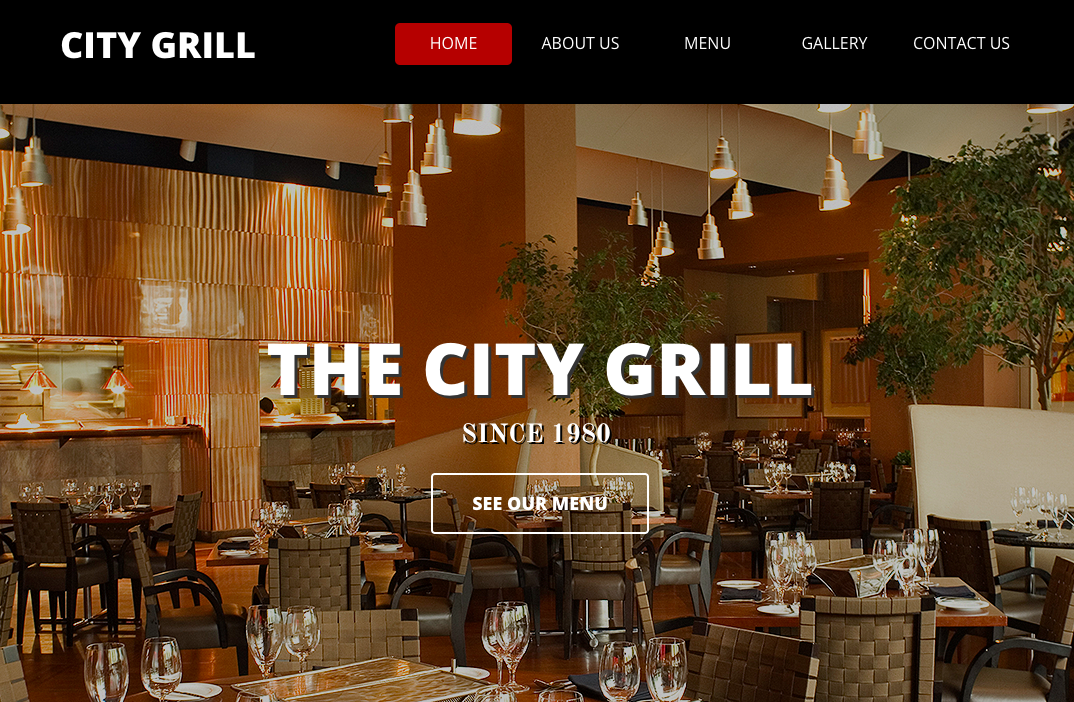
Get a head start on website creation with AI
Create a custom website tailored to your business needs 10X faster with 10Web AI Website Builder!
Ease of use
Ease of useReflects the platform’s overall user-friendliness.Score
Components:
- Learning curve (40%): Quickness and ease of getting started.
- Interface design (30%): Simplicity and intuitiveness of layout.
- User guidance (20%): Quality of tutorials and support.
- Flexibility (10%): Adaptability to various user skills.
 7.5
7.5
 8.0
8.0
🏆 Winner: HostGator
. With a score of 8.0, HostGator’s website builder, Gator, is known for its simplicity and user-friendly interface, making it a great choice for beginners and small businesses. Webflow, scoring 7.5, offers a visually intuitive interface but has a steeper learning curve, making it more suitable for experienced designers and developers.
Learning Resources
🏆 Winner: Webflow
. Both platforms offer solid learning resources, but Webflow goes a step further with its comprehensive set of tutorials and courses, making it easier for users to learn and adapt.
For ecommerce
EcommerceMeasures the platform’s effectiveness in supporting online business activities.Score Components:
- Ecommerce themes and templates (20%): Variety and design of templates.
- Product management (25%): Ease of managing and organizing products.
- Payment options (25%): Variety and convenience of payment methods.
- Ecommerce features (20%): Features for managing an ecommerce store.
- Integration (10%): Compatibility with external e-commerce tools and services.
 8.5
8.5
 6.3
6.3
Webflow and HostGator both offer ecommerce capabilities, but they cater to different needs and levels of customization. Webflow is a robust platform for creating online stores, offering comprehensive ecommerce features such as easy store creation without coding, extensive customization options, product management with variations, inventory tracking, integration with major payment gateways, automated shipping calculations, tax configuration, and marketing tools like abandoned cart recovery and email marketing. On the other hand, HostGator’s website builder includes ecommerce features that allow users to create an online store where they can sell products and services directly from their website. However, on lower Express Start and Express Site plans there’s a significant limit on the number of products: 3 and 10 respectively, and unlimited number of products on higher Express Store plan.

|

|
|
|---|---|---|
|
Ecommerce themes and templates |
7.5 |
7.0 |
|
Product page customization |
8.3 |
6.5 |
|
Payment processing and commissions |
7.8 |
6.0 |
|
POS capabilities |
6.5 |
5.0 |
|
Payment gateways |
8.0 |
5.5 |
|
Product numbers |
7.0 |
4.5 |
|
Additional ecommerce features |
7.9 |
6.5 |
Webflow ecommerce features:
- Checkout and Payment Processing with Stripe, PayPal, etc.
- Marketing and Promotions
- Tax and Shipping calculations
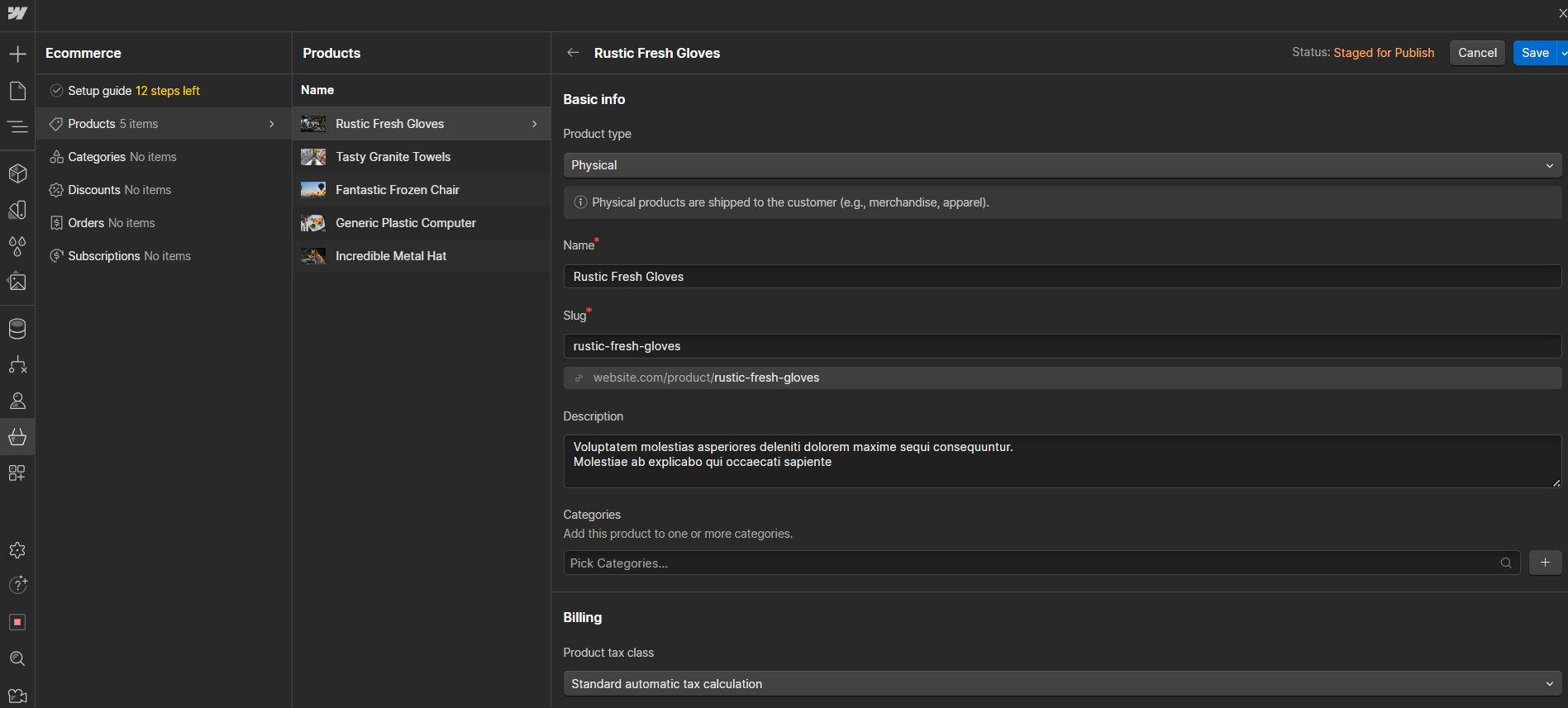
HostGator ecommerce features:
- Secure Online Payments
- Unlimited Products
- Product Search & Filtering
- Wishlists & Gift Cards
- Multi-Channel Inventory Management
- Shipping Labels
Ecommerce themes & templates
Webflow offers a diverse range of ecommerce themes and templates designed to cater to various types of online stores, from fashion and technology to artisan crafts and children’s products. Each template comes equipped with built-in ecommerce functionality, allowing you to easily add products and manage your store without the need for coding. HostGator’s website builder caters to eCommerce needs by offering a broad selection of free templates, all designed with mobile responsiveness in mind. These templates are equipped with essential eCommerce features such as product catalogs and payment processing options.
Product page customization
Webflow offers extensive customization options for eCommerce product pages, allowing users to design and personalize their pages without coding. It provides tutorials for creating product pages from scratch, offers responsive templates for various devices, and allows users to add custom code and dynamic content using Webflow’s CMS for maximum customization flexibility. HostGator Website Builder offers basic features for customizing product pages, enabling users to add products with details such as name, price, description, and images. It supports product variants and categorization to enhance customer navigation. Advanced settings include inventory management, discount options, and the ability to set products as shippable or downloadable.
Payment processing
When it comes to payment processing, Webflow provides a flexible and secure platform for payment processing and ecommerce through integrations with leading payment gateways like Stripe and PayPal. This allows users to accept a wide range of payments, including credit card transactions directly from their websites. HostGator Website Builder integrates with PayPal as a payment gateway for processing transactions. This is particularly highlighted in their offerings, suggesting that PayPal is a primary option for e-commerce activities within the platform. The platform charges a 3% transaction fee on Express Store and Express Site plans, no transaction fees are charged on higher Express Store plan. Considering the features, availability, cost, and flexibility, Webflow appears to be a more robust and flexible ecommerce solution compared to HostGator. However, if you are looking for a more budget-friendly option with some free extras, HostGator might still be worth considering.
Website Editors
Website EditorsEvaluates the platforms’ website building and editing capabilities.Score Components:
- Customization tools (40%): Range and power of editing features.
- Editor usability (30%): User experience within the editor.
- Design flexibility (20%): Freedom in layout and design changes.
- Update and maintenance ease (10%): Simplicity of updating and maintaining the site.
 9.0
9.0
 7.3
7.3
🏆
Winner: Webflow
. Webflow, with a score of 9.0, is a cloud-based platform that combines web design, CMS, and hosting, enabling users to visually design responsive websites without writing code. It offers a drag-and-drop interface, integrated SEO tools, ecommerce functionalities, and the ability to add animations and interactions, making web development accessible for designers and powerful for developers. Webflow streamlines the process of web creation, from design to launch, offering both high customization and ease of use.
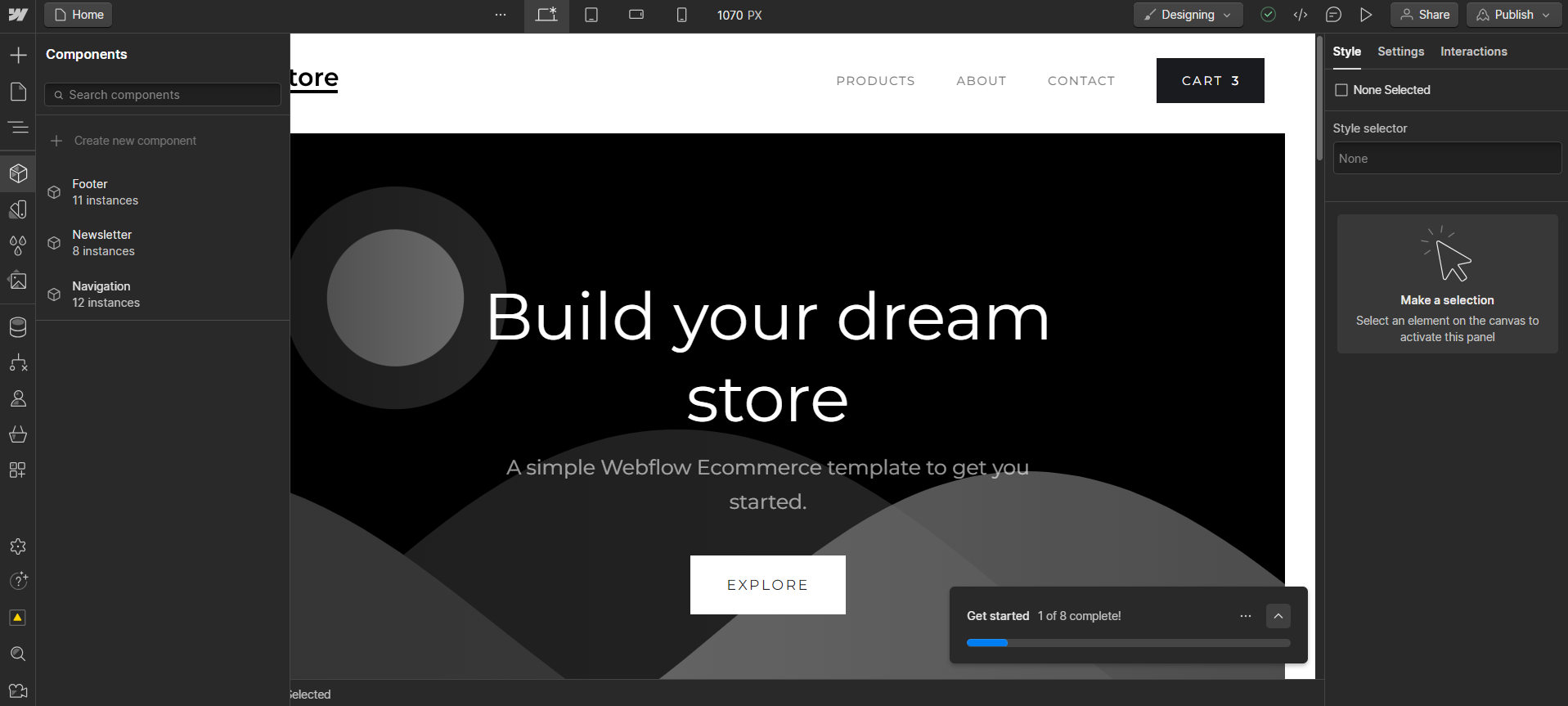
HostGator’s website builder, scoring 7.3, offers a user-friendly drag-and-drop editor, enabling users to easily create and customize their websites without needing any coding knowledge. It provides a wide range of templates that are fully customizable, allowing for the personalization of layouts, colors, and fonts to match the user’s brand identity. Additionally, the editor supports the integration of various multimedia elements like images, videos, and social media links, enhancing the visual appeal and functionality of the website.
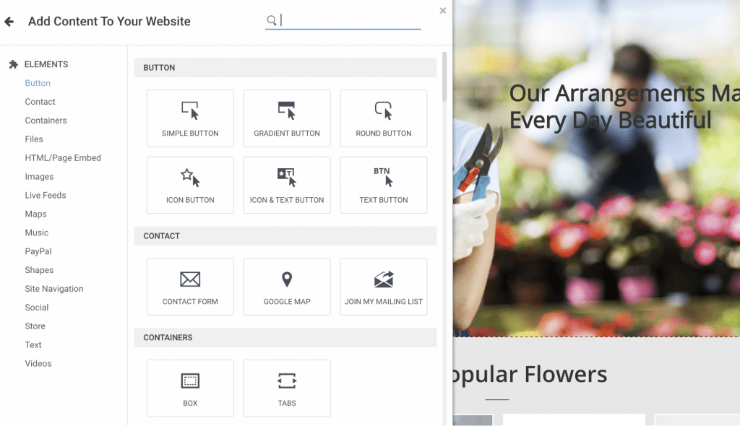
Mobile editor/app
 7.0
7.0
 4.0
4.0
🏆
Winner: Webflow
. Both Webflow and HostGator lack official mobile editor apps, but they offer different solutions for mobile editing. Webflow users can use a third-party app called EditFlow, which is only available for iOS. This app allows users to make changes to their websites from their mobile devices, providing a certain level of convenience for on-the-go editing.
HostGator, on the other hand, does not have a mobile editor app. However, it does allow for some small changes to be made using a mobile browser. This feature may be useful for minor adjustments, but it does not provide the same level of functionality and convenience as a dedicated mobile app.
In summary, while neither platform offers an ideal solution for mobile editing, Webflow comes out on top due to the availability of the EditFlow app.
Product testing options
Product Testing OptionsAssesses the options for trying out platform features before commitment.Score Components:
- Trial quality (40%): Extent and usefulness of the trial or free version.
- Feature accessibility (30%): How many features are available to test.
- Trial duration (20%): Length of the trial period.
- Ease of transition (10%): Smoothness of moving from trial to paid plans.
 6.3
6.3
 2.6
2.6
Overall Result
:
Webflow wins
. Webflow scores 6.3 in product testing options, significantly higher than HostGator’s 2.6. Webflow offers a free version where users can test some basic features. However, it does not provide a trial version or a money-back guarantee. On the other hand, HostGator does not offer a free or trial version, but it allows users to test all features within a 30-day refundable period. It also offers a 30-day money-back guarantee, with some exceptions.

|

|
|
|---|---|---|
|
Free Plan |
Yes |
No |
|
Trial Duration |
No | No |
|
Testing Premium Features |
Some basic features with free plan |
All features within 30-day refundable period |
|
Money Back Guarantee |
No |
30-day (with exceptions) |
Price
PriceLooks at the cost-effectiveness and value for money of each platform.Score Components:
- Plan value (40%): What each pricing tier offers.
- Transparency and clarity (30%): Clearness of pricing structures.
- Flexibility of plans (20%): Range of options to suit different budgets.
- Hidden costs (10%): Additional expenses not included in the plan.
 8.0
8.0
 6.2
6.2
Webflow offers a wider range of pricing options, including a free plan and custom pricing for enterprise-level needs. HostGator, on the other hand, offers fewer plans but provides significant discounts for annual subscriptions.

|

|
|
|---|---|---|
|
Free |
Starter (Free): Limited features for new sites, including 2 static pages and 50 form submissions lifetime. |
No offering at this amount. |
|
$10-$14 |
No offering at this amount. |
Express Start ($12.95/month): Includes hosting, basic analytics dashboard, 3 email campaigns per month, up to 3 products. Value for price: 6.0 |
|
$14-$20 |
Basic ($18/month): Suitable for simple sites with a custom domain, including basic SEO controls and 500 monthly form submissions. And 100 pages. Value for price: 6.5 |
Express Site ($14.98/month): Offers hosting, advanced analytics dashboard, 5 email campaigns per month, up to 10 products. Value for price: 7.0 |
|
$20-$30 |
CMS ($29/month): For content-driven sites with 2,000 CMS items, 1,000 monthly form submissions, and full API access. And 150 website pages. Value for price: 7.5 |
Express Store ($26.98/month): Comprehensive plan including hosting, advanced analytics dashboard, 10 email campaigns per month, unlimited products. Value for price: 8.5 |
|
$40-$45 |
Standard ($42/month): For new businesses with up to 500 ecommerce items, includes basic ecommerce features, and 2% transaction fee Value for price: 8.5 |
No offering at this amount. |
|
$45-$50 |
Business ($49/month): High traffic capacity, advanced features like site search, and up to 10 content editors. Value for price: 8.0 |
No offering at this amount. |
|
$80-$90 |
Plus ($84/month): Higher volume businesses with 0% transaction fees, up to 5,000 ecommerce items, and advanced features. Value for price: 9.0 |
No offering at this amount. |
|
$200+ |
Advanced ($235/month): Scalable solution for large online stores with up to 15,000 ecommerce items and the highest caps and 0% transaction fees. Value for price: 9.5 |
No offering at this amount. |
location. As a result in rare cases the prices displayed here can differ from the ones you see on their
websites.
Hosting quality
Hosting
qualityExamines the reliability and performance of the hosting solutions.Score Components:
- Uptime (40%): Consistency and reliability of website availability.
- Speed (30%): Loading times and performance.
- Bandwidth and storage (20%): Sufficiency of resources provided.
- Data centers (10%): Quality and distribution of hosting infrastructure.
 8.9
8.9
 8.0
8.0
🏆
Winner: Webflow
Webflow offers managed hosting with a 99.99% uptime, and leverages a globally distributed network of data centers from Amazon Web Services (AWS) and Fastly. HostGator, on the other hand, offers shared, managed WordPress, VPS, and dedicated hosting with a 99.9% uptime and has 4 data centers. While both offer quality hosting services, Webflow’s managed hosting and higher uptime give it the edge.

|

|
|
|---|---|---|
|
Do they offer hosting? |
Yes, included in all paid plans |
Yes, included in all paid plans |
|
Data Centers: |
Webflow doesn’t actually have its own data centers. Instead, it relies on a globally distributed network of data centers from Amazon Web Services (AWS) and Fastly |
4 data centers: US(Texas, Utah), India(Mumbai), China(Hong Kong) |
|
Type of hosting: |
Managed Hosting |
Shared, Managed WordPress, VPS, Dedicated |
|
Uptime: |
99.99% |
99.9% |
|
Uptime Guarantee: |
Only Enterprise plan, 99.99% |
Yes, 99.9% |
Website Speed Optimization
Website Speed OptimizationEvaluates optimization of website loading timesScore Components:
- PageSpeed Score (30%): Google’s score indicating performance optimization.
- Loading Time (30%): The average time until a website is fully interactive.
- Mobile Optimization (15%): Optimization effectiveness for mobile devices.
- Resource Optimization (15%): Optimizing images, scripts, and other heavy resources.
- CDN Usage (10%): Use of CDN to enhance speed across geolocations.
 8.1
8.1
 6.2
6.2
🏆 Winner: Webflow
Both Webflow and HostGator prioritize website performance and page speed, but Webflow’s comprehensive strategies and better Website Speed Optimization score give it the edge.

|

|
|
|---|---|---|
|
Focus |
Custom Cache Settings, Custom Element Lazy Loading, Automatic Minification, Responsive templates, CDN |
Browser Caching, CDN |
|
Performance Tools |
Google Lighthouse, PageSpeed Insights |
Google PageSpeed Insights |
|
Key Strategies |
Custom Cache Settings, Custom Element Lazy Loading, Automatic Minification, Responsive templates, CDN |
Browser Caching, CDN |
|
Load Times |
Below 2 seconds average |
Varies widely, depending on the optimization, website complexity and the chosen hosting plan |
|
Page Speed Scores Range |
77.2/100 |
Varies widely |
|
Core Web Vitals Improvement |
Improving components’ usability, and emphasis on LCP, FID and CLS |
Guidance on understanding and improving Core Web Vitals (CWV) for websites. The emphasis is LCP, FID, CLS improvements |
Webflow’s approach to enhancing site speed includes custom cache settings, custom element lazy loading, automatic minification, responsive templates, and a content delivery network (CDN). This comprehensive strategy results in an average load time of below 2 seconds and a PageSpeed score of 77.2/100. Webflow also focuses on improving components’ usability and the Core Web Vitals (LCP, FID, and CLS).
On the other hand, HostGator’s strategies for speed optimization include browser caching and a CDN. However, both load times and PageSpeed scores vary widely, depending on the optimization, website complexity, and the chosen hosting plan. HostGator provides guidance on understanding and improving Core Web Vitals (CWV) for websites, with an emphasis on LCP, FID, and CLS improvements.
Get a head start on website creation with AI
Create a custom website tailored to your business needs 10X faster with 10Web AI Website Builder!
Plugins and integrations
Plugins and integrationsMeasures the range and effectiveness of additional plugins and integrations.Score Components:
- Variety of options (40%): Range of available add-ons.
- Integration smoothness (30%): Ease of integrating plugins into the site.
- Quality of plugins (20%): Functionality and reliability of the options.
- Custom integration capabilities (10%): Support for custom or third-party integrations.
 5.5
5.5
 7.3
7.3
🏆 Winner: HostGator.
With a score of 7.3, HostGator offers a wide range of plugins, known as apps, accessible via their app market. These apps cater to diverse needs such as advertising, website analytics, integrating social media, managing appointments, and conducting email marketing. Pricing for these apps ranges from free options to monthly subscriptions and one-time purchases. Additionally, it is possible to integrate some third parity plugins within your website for more functionality.
On the other hand, Webflow, with a score of 5.5, doesn’t have plugins or extensions in the traditional sense. Instead, it offers a built-in library of website elements and functionalities that you can use to create your website. This library is constantly being expanded, so you’ll always have access to the latest features and tools. However, Webflow does integrate with a number of third-party services and tools that can add even more functionality to your website. These integrations are not managed by Webflow, so the number of available options and their pricing structures can vary depending on the specific tools you choose.
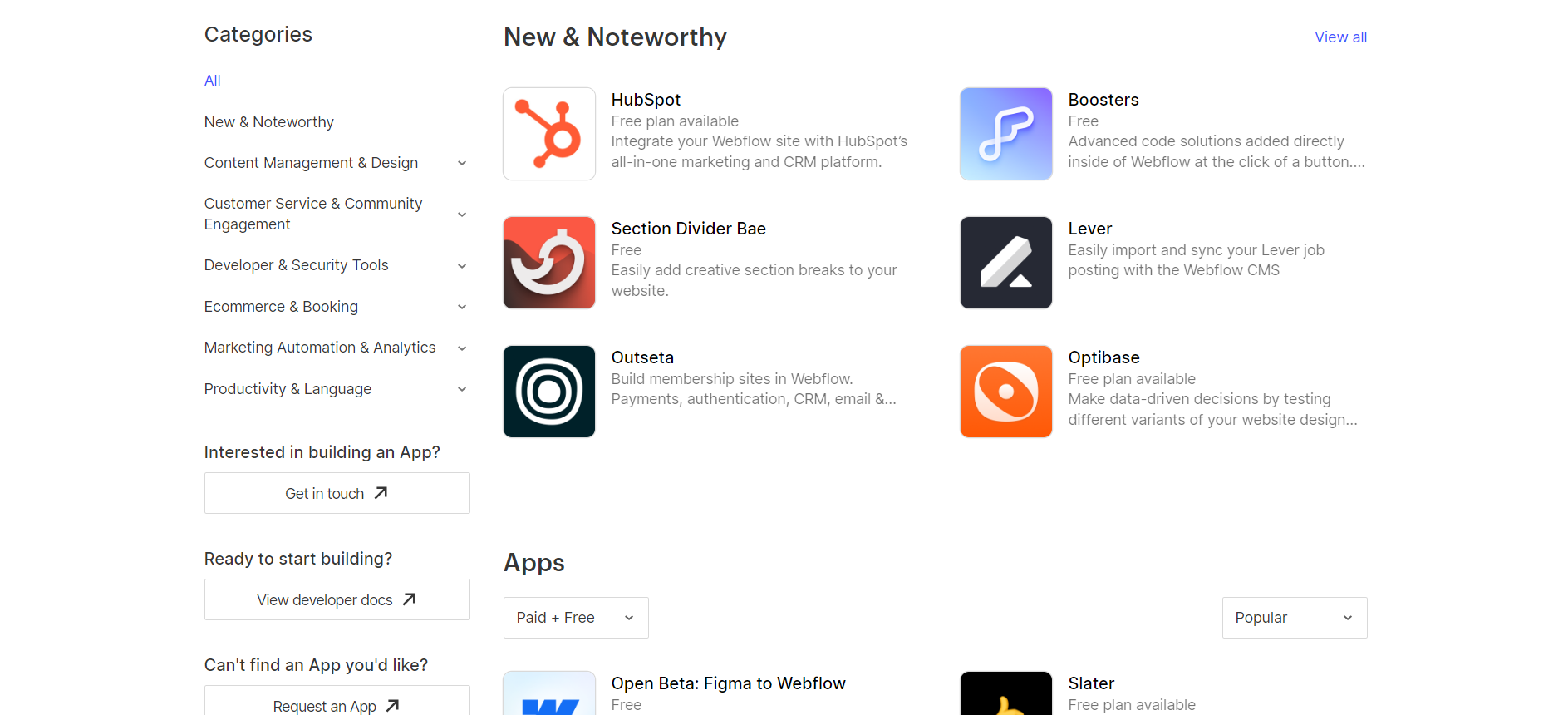
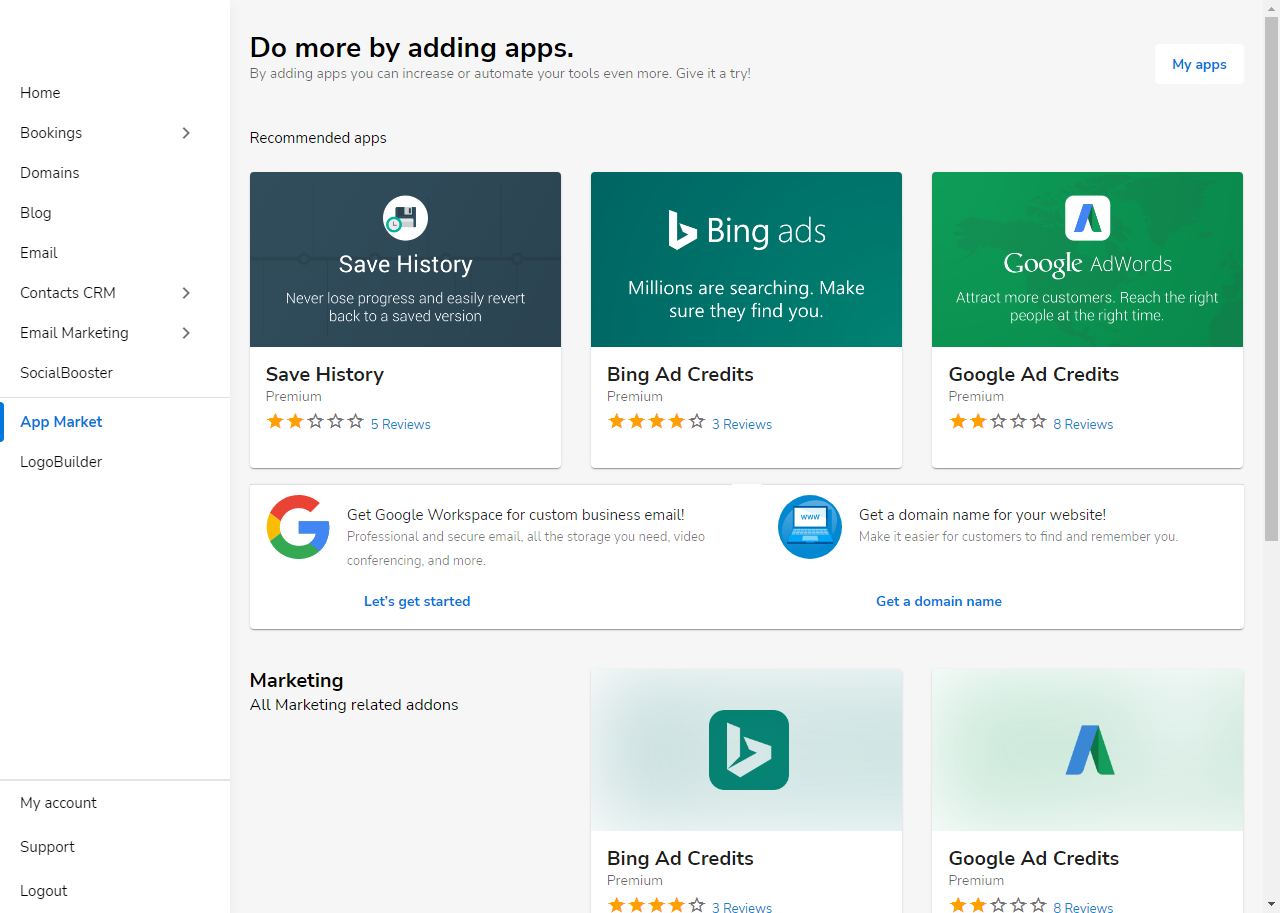
Marketing Features
Design FunctionalitiesRepresents how well each platform allows for creative design and customization of websites.Score Components:
- Template Variety (30%): Range and quality of design templates.
- Customization (30%): Flexibility and options for design alterations.
- User Interface (20%): Ease and intuitiveness of the design process.
- Responsiveness (10%): Adaptability to different devices and screen sizes.
- Innovation (10%): Unique design features and tools.
 7.8
7.8
 6.9
6.9
🏆
Overall Winner: Webflow
. Webflow stands out for its comprehensive marketing tools, especially in analytics and ad campaign management. HostGator is strong in SEO tools and blogging, ideal for content-driven strategies.

|

|
|
|---|---|---|
|
SEO Tools |
|
|
|
Email Marketing |
|
✓ (on higher plans) |
|
Blogging |
|
|
|
Social Media Integration |
Simplifies content sharing and audience engagement |
Easy linking and social post creation |
|
Analytics and Reporting |
Integrates with Google Analytics |
Google Analytics integration (on higher plans) |
|
Ads and Promotions |
Supports ad and promotion management |
Google Ads and Bing Ads integration |
Customer Support
Customer supportEvaluates the quality and availability of support options.Score Components:
- Response time (40%): Speed of support responses.
- Support quality (30%): Effectiveness and helpfulness of the support.
- Availability (20%): Range of support channels (phone, chat, email).
- Resource richness (10%): Quality of self-help and educational materials.
 8.3
8.3
 7.3
7.3
🏆 Winner: Webflow
. In the Webflow vs HostGator comparison, Webflow takes the lead with a customer support score of 8.3. Webflow offers 24/7 support through live chat, email, and a community forum, ensuring users have access to assistance whenever needed. Additionally, Webflow provides extensive documentation and video tutorials, making it easier for users to navigate the platform and resolve issues independently.
HostGator, with a customer support score of 7.3, also provides 24/7 support through email, phone, and live chat. While HostGator’s support is reliable and accessible, it lacks the specialized enterprise support that Webflow offers. HostGator’s support channels are effective for general inquiries and troubleshooting, but Webflow’s comprehensive resources and dedicated enterprise support give it an edge in this category.
Security
SecurityLooks at the platforms’ security measures and data protection.Score Components:
- Data protection (40%): Safeguards for user and customer data.
- SSL and encryption (30%): Implementation of secure connections.
- Compliance (20%): Adherence to industry security standards.
- Regular updates (10%): Frequency of security updates and patches.
 7.8
7.8
 7.4
7.4
🏆
Winner: Webflow
. Webflow and HostGator both prioritize security, but Webflow edges out with a slightly higher security score of 7.8 compared to HostGator’s 7.4. Webflow ensures the privacy and security of user data with robust encryption techniques, strict access controls, regular system updates, and audits. They also offer SSL encryption for data transmission and two-factor authentication for added security.
HostGator also emphasizes data protection with features like SiteLock for malware scanning and a commitment to GDPR compliance. They secure their servers against various threats, including DDoS attacks, with extensive custom firewall rules and mod security rule sets. They also conduct regular password audits and offer SiteLock Security services for enhanced protection. However, website owners are responsible for aspects such as password security, updating applications, and ensuring their site is malware-free.
AI Capabilities
AI capabilitiesMeasures the effectiveness of AI-driven features and tools.Score Components:
- Automation efficiency (40%): Impact of AI on streamlining processes.
- Personalization (30%): AI-driven customization for users or customers.
- AI-Assisted design (20%): Role of AI in website design and functionality.
- Data analysis (10%): Use of AI in interpreting user data and analytics.
 8.3
8.3
 2.6
2.6

|

|
|
|---|---|---|
|
AI Builder |
|
Basic AI capabilities in new website builder |
|
AI Ecommerce features |
|
|
|
AI content generation |
|
|
|
Additional AI features |
Announced AI features for design suggestions and content management |
|
🏆 Winner: Webflow
. Although neither platform currently offers extensive AI capabilities, Webflow, with a score of 8.3, has announced plans to introduce AI features that could significantly enhance the user experience. These include smart suggestions for design elements and layouts, and AI-powered content management capabilities.
HostGator, with a score of 2.6, has launched a new website builder with basic AI technologies, but lacks built-in AI features. While this is a step in the right direction, it falls short of the potential AI enhancements announced by Webflow.
User Management
User ManagementAssesses the platforms’ capabilities in managing user roles, permissions, and accessibility.Score Components:
- Role Customization (40%): Flexibility in creating and defining user roles and
permissions. - Ease of Management (30%): User interface and tools for managing users.
- Access Control (20%): Effectiveness of access control measures for different user
levels. - Scalability (10%): Ability to manage a growing number of users efficiently.
 8.3
8.3
 3.2
3.2
🏆 Winner: Webflow
. Webflow offers a comprehensive user management system with various roles and access levels, while HostGator does not provide clear information about user roles and access levels for their website builder.
- Webflow: The number of users who can edit a website and their access levels vary by plan. Core, Growth, and Enterprise plans offer unlimited editors, while others limit content editors to 3 or 10 per site. Access levels include Designer for full access and Editor for content editing. Workspace roles like Admin, Designer, and Editor ensure collaboration and security through features like the Site Activity Log and role-based permissions.
- HostGator: Hostgator mentions the possibility to have multiple users for its hosting solutions, however there’s no mention whether that the mentioned users have the permission to edit the websites built with their website builder.
Webflow User Roles and Access Levels:
| Role | Description | Access Highlights |
|---|---|---|
| Workspace Owner | Full control over Workspace settings and member management. | Edit settings, manage billing, access/edit all sites, invite/remove members, manage permissions. |
| Workspace Admin | Similar to the owner with some restrictions. | Edit settings, manage billing, access/edit all sites, invite/remove members (except owner), manage permissions. |
| Workspace Member | Limited control focused on site interaction. | Download invoices, access/edit sites, invite members. |
| Workspace Guest | Temporary collaborators with limited access. | Access/edit sites. |
| Workspace Commenter | Limited to commenting for feedback on sites. | Create/view/resolve comments, preview sites. |
| Site Admin | Full control at the site level. | Manage permissions, delete/transfer sites, billing management, design and publish changes. |
| Can Design | Design capabilities with some restrictions on publishing. | Design in Designer, create/modify classes and components, publish changes with permission. |
| Can Design (Limited) | Restricted design capabilities for Enterprise customers. | Create new classes, modify created classes, limited publishing capabilities. |
| Can Edit | Content editing without full design privileges. | Edit text/links/images, manage assets, publish Collection items and Ecommerce products. |
| Can Comment (Site Level) | Commenting for feedback at the site level. | Create/view/resolve comments, preview sites. |
Additional Features

|

|
|
|---|---|---|
|
SSL Certificate |
|
|
|
Custom Domain |
|
|
|
Free Custom Domain Included |
|
|
|
International Domains |
|
|
|
Mobile Responsive |
|
|
|
Page Speed |
|
|
|
Website Builder Mobile App |
|
|
|
Convert a Website To An App |
|
|
|
Website Analytics |
|
|
|
Multilingual Sites |
|
|
|
Multiple Users |
|
|
User Feedback
Webflow receives high praise for its user-friendly interface, eliminating the need for coding while offering extensive design flexibility. Users appreciate its scalability, cost-effectiveness, and seamless integration of essential features like forms and CMS. However, some users note a slight learning curve and occasional limitations, particularly in ecommerce functionalities and content management. Overall, Webflow proves to be a powerful tool for building and managing websites, offering robust features for both beginners and experienced developers, albeit with some room for improvement in certain areas like collaborative editing and content management.
HostGator’s website builder receives mixed reviews from users, highlighting both its strengths and areas for improvement. Users appreciate the platform for its ease of use, making it accessible even for novices to build professional-looking websites, and for its range of web services that facilitate website creation and management, including domain registration and SSL certificates. However, concerns are raised regarding its customer support, which is often described as slow or unresponsive, potentially impacting users requiring timely assistance. Additionally, some users find the pricing structure to be high, particularly for small-scale developers or those needing only basic services.
The making of this blog
We followed a clear, step-by-step process to write and research this article.
FAQ
Which platform is better for professional web design, Webflow or HostGator?
Can I use both Webflow and HostGator for ecommerce?
How do Webflow and HostGator compare in terms of ease of use?
What are the major differences in pricing between Webflow and HostGator?
Which platform offers better customer support, Webflow or HostGator?
Are there any significant differences in hosting quality between Webflow and HostGator?
Which platform is better for SEO and marketing features, Webflow or HostGator?










